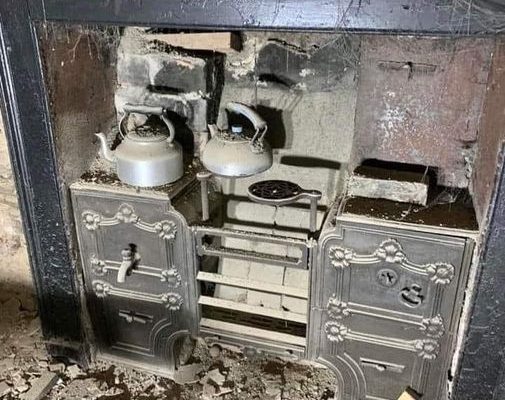A questioner asked:
“We pulled down a false wall in the cellar of our 1857 house and found this! What is it? Any idea?”
Some of the comments about this discovery were:
- “How come no one is talking about the tea kettle that’s just suspended in the air?”
- “Weird it was covered.”
- “My mother cooked on one of these. She made amazing meals, also bread and cakes. Friday was bake day. We lived on the moors in the borders of England and Scotland. I now live in western Maryland, US.”
- “Excellent find, too bad it was not a treasure chest.”
- “That is beautiful. An antique dealer will give you quite a lot of money for that. I wouldn’t move it or touch it until I talk to antique dealers.”
- “What an amazing find. I wonder why the former owners covered that up.”
- “Nice! I would start tearing down other walls, maybe find something else!”
- “It was probably too heavy to get it out of the cellar, so they left it.”
- “Wow, lucky you! I would be over the moon and use it with pride. I remember staying with my nan at weekends. She had one and I remember her having an iron on there to do her ironing and doing toast on the fire. It was lovely. Lucky you! ❤️”
- “What a treasure!”
- “So the original kitchen may have been in the cellar, or it was the kitchen for the servants. Love it.”
- “I’d leave it right there. Dust it off. Then design around it. It would be the focal point of your room.”
- “NO!!! Is it full size or a child’s size? Whatever! What a FIND!”
- “It appears like they intentionally closed up the fireplace with stove and kettles intact for a future find like this. As a builder/contractor, we almost always leave little mementoes or time capsules in the wall or closed-off portions of the build. We often include the owners’ information and pictures as well as our information. Coins from the year we did the project. Even brand-new tape measures or hammers. Sometimes I’ve included brief essays on current events or political thoughts. It’s fun.”
- “Imagine putting a wall up with the kettles still on the stove!”
- “It looks child-size. That’s truly amazing!”
- “Do you think this was the original kitchen?”
- “Wow! They left the teapots in there!”
- “I used to black lead one of these for my gran when I was a child. Black lead can still be bought; it will come up like new.”
- “That old black grate is in great condition. So what are you going to do with it?”
Owning an old house often feels like holding a piece of history in your hands. Each creak and groan of the floorboards, each worn corner, and each weathered brick tells a story. When we bought our 1857 home, we knew it had secrets. Little did we know that one of its most remarkable stories was waiting to be uncovered behind a false wall in the cellar.
The Discovery
Our journey began with a simple home improvement project. The cellar, with its stone walls and cool, damp air, had always intrigued us. One wall, in particular, seemed different. It sounded hollow when tapped and had an odd, almost hidden, seam running down its length. Curiosity got the better of us, and with a few tools and a lot of determination, we decided to investigate.



